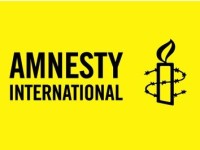
Over the weekend, Ugandan president Yoweri Museveni signed into law a bill that criminalizes being gay. Moreover, it criminalizes the "promotion of homosexuality," which will directly impact human rights defenders, healthcare providers or others providing services to lesbian, gay, bisexual and transgender people. These additional restrictions on top of already discriminatory policies directly undermine the human rights to privacy, health and freedom of expression and association -- as the way the laws in Uganda and Nigeria have been written, conducting sex education or trainings on HIV and AIDS could be interpreted as promoting homosexuality and result in jail time of several years.
Such discriminatory laws against members of the LGBT community do not only exist across oceans. An unfortunate comparison can be drawn with legislative proceedings happening right here in the United States. After widespread public outcry, Arizona Governor Jan Brewer vetoed one such bill Wednesday that that would have allowed business owners, as long as they asserted their religious beliefs, to deny service to gay and lesbian customers. This bill, spearheaded ostensibly on the grounds of "protecting religious liberty," would have protected no one's freedom, but rather would have served to perpetuate intolerance and hostility. Similar laws have been introduced and await passage in Kansas, Oregon, Oklahoma and Idaho.
Lest anyone suggest discrimination in the United States is benign in comparison to what has unfolded in Uganda, we should take a closer look at the pain and suffering -- and yes, the hatred -- laws like these fuel.
Uganda's legislation will institutionalize hatred and discrimination against lesbian, gay, bisexual, transgender and intersex people in Uganda just as similar legislation has done in other African countries. In Cameroon, family members of one gay man reportedly prevented him from seeking medical treatment because, for them, it was better that he was dead than alive and gay. In Nigeria, within hours of President Goodluck Jonathan signing the comparable Same Sex Marriage (Prohibition) Act, people accused of being gay were rounded up and arrested in at least four states, while others suspected of being gay were placed on watch lists. Some gay rights activists in Cote D'Ivoire went into hiding following a series of raids and arrests in late January. Gambia's president compared gay "vermin" to malaria causing mosquitoes. President Jammeh went on to refer to LGBT as standing for Leprosy, Gonorrhea, Bacteria and Tuberculosis. Late last year, Museveni reportedly wrote that while lesbians are sexually starved women and gay men are abnormal, they can still be rescued.
These comments, laws and policies amount to a free pass for members of the general public to take the law into their own hands and "fix" what is considered wrong with members of the LGBT community, and as has been demonstrated in the past, they will take that opening and run with it.
These governments have continued to run roughshod over guaranteed fundamental human rights that they are obligated to protect under the International Covenant on Civil and Political Rights and the African Charter on Human and People Rights. What should further disturb all of us is the support that these governments are enjoying for officially targeting a group of people that has committed no crime, stripping them of their constitutional rights to be free from discrimination or to be protected by the law just as their neighbors are.
While some may hesitate at making such linkages, how is this justification so different from that which led to the mayhem that exploded in Rwanda in 1994 when the majority Hutu government decided to try to eliminate all the Tutsis, whom they referred to as cockroaches? Or from the ethnic cleansing currently underway in the Central African Republic, where Muslims and Christians who had lived next to each other for decades in peace have now taken turns slaughtering each other as well as persons "suspected" of being sympathizers of the other religion, after a military coup comprised of primarily Muslim soldiers unleashed months of brutal human rights abuses that have now been replaced by equally brutal abuses by anti-Muslim militias? How is this different from the blatant fiction of Apartheid South Africa? As Nobel Peace Laureate Archbishop Desmond Tutu said last week, "The history of people is littered with attempts to legislate against love or marriage across class, caste and race. But there is no scientific basis or genetic rationale for love. There is only the grace of God. There is no scientific justification for prejudice and discrimination, ever. And nor is there any moral justification. Nazi Germany and apartheid South Africa, among others, attest to these facts."
The list of situations in which prejudice has been used to justify violence and persecution could go on, and sadly, sub-Saharan Africa has too many examples. But is not just an African problem.
Wherever we find it, legislation that targets people for their sexuality is inherently dehumanizing and must be fought urgently and passionately. Today, it is the LGBT community. Tomorrow, it could be anyone.
We cannot allow such discrimination to stand.
This post is part of a series produced by The Huffington Post and Amnesty International USA in the theme of "Bringing Human Rights Home." Read all posts in the series here. Visit here to learn more about Amnesty International USA's work to protect the basic dignity of LGBT people across the globe. Follow Amnesty International USA on Facebook and on Twitter: @amnesty.